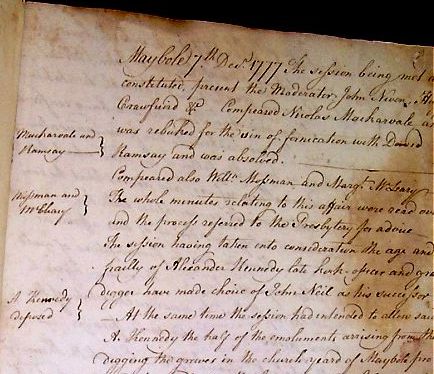
Above, a page from the minutes of a Kirk Session.
Composed of the Minister and lay elders, Kirk Sessions worked hard to instill in their congregations an understanding of their faith and a way of life consistent with that faith. When members of that congregation were thought to have acted improperly, the Kirk Session could compel the parishioners to appear before them to admit and do penance for their sins. As a Court of the Church, the Kirk Session could make inquiries, call witnesses, and call a suspect to interrogation.
While the function of the Kirk Session was universally acknowledged, the variety of offenses that fell under its purview could be great. Censure would be threatened, if not applied, to dishaunters of ordinance (people who stayed away from church), women who indulged in idle claik (the sound that geese made) about the kirk door on Sunday, women who used their tongues in vulgar and scandalous flyting (i.e., scolding, using abusive language), drunkenness, swearing, cursing, filthy speaking, mocking of religion, and ignoring the Sabbath (e.g., hiring servants, working, selling unnecessary things, playing football/skittles, and especially drinking on the Sabbath.) To combat vagrancy, a special act might require outsiders to produce satisfactory testificats (proof of a person's good character). If they could not, they and anyone in the parish who associated with them could be labeled scandalous persons. The Kirk Session might also involve itself to restrain Penny Wedding ceremonies from becoming too festive. (In Penny Bridals/Weddings, guest contributed a penny to defray the cost of their entertainment. Since they were paying for their entertainment, it was not unusual for guests to celebrate as heartily and as long as they could in order to get full value for their penny.)
As the parish body responsible for caring for the morals of the parish, sexual indiscretions received widespread attention. Conception outside wedlock was very common. The Kirk Sessions struggled to control sexual behaviour, punishing fornication and adultery since, apart from the sinfulness involved, the Church would have to support the mother and child if the father was not named by the mother or if he did not come forward. (Kirk Session fines were used to support the poor in a parish.)
Conception outside of wedlock was very common. Church elders kept their eyes and ears open for any hint of scandal which they would then report at meetings of the Kirk Session. The accused would then have to compear (appear) before the Session and respond to accusations. Usually, the woman would appear first and be asked to name the father. She might refuse, in which case the midwife might be enlisted to ask the woman for the father's name while she was in fear of dying in the throes of childbirth. Kirk Session inquiries extended also to married couples when a child was born eight months or less after the wedding ceremony. If so, the couple would have to do penance for the sin of Ante-nuptial fornication.
Discipline was applied in proportion to the offense. A fine of 4 to 6 pounds Scots (equivalent to 4-6 shillings Sterling) was common. In addition, defaulters might be required to make a number of appearances in the church where they would be publicly rebuked. For single offences that bore no special aggravation, one or two appearances was deemed sufficient if the offenders carried themselves properly. However, trelapsers (i.e., participants in fornication) might be required to appear in sackcloth in front of the church for numerous sessions, and only if they appeared to understand their sin might they than be allowed to pay their fine and be absolved.
Sources
Smout, T.C. (1998). A History of the Scottish People, Fontana Press.
Various web sites, including
Perthshire Diary (http://www.perthshirediary.com)
Rural Life in the 18th Century (www.electricscotland.com/history/rural_lifendx.htm)